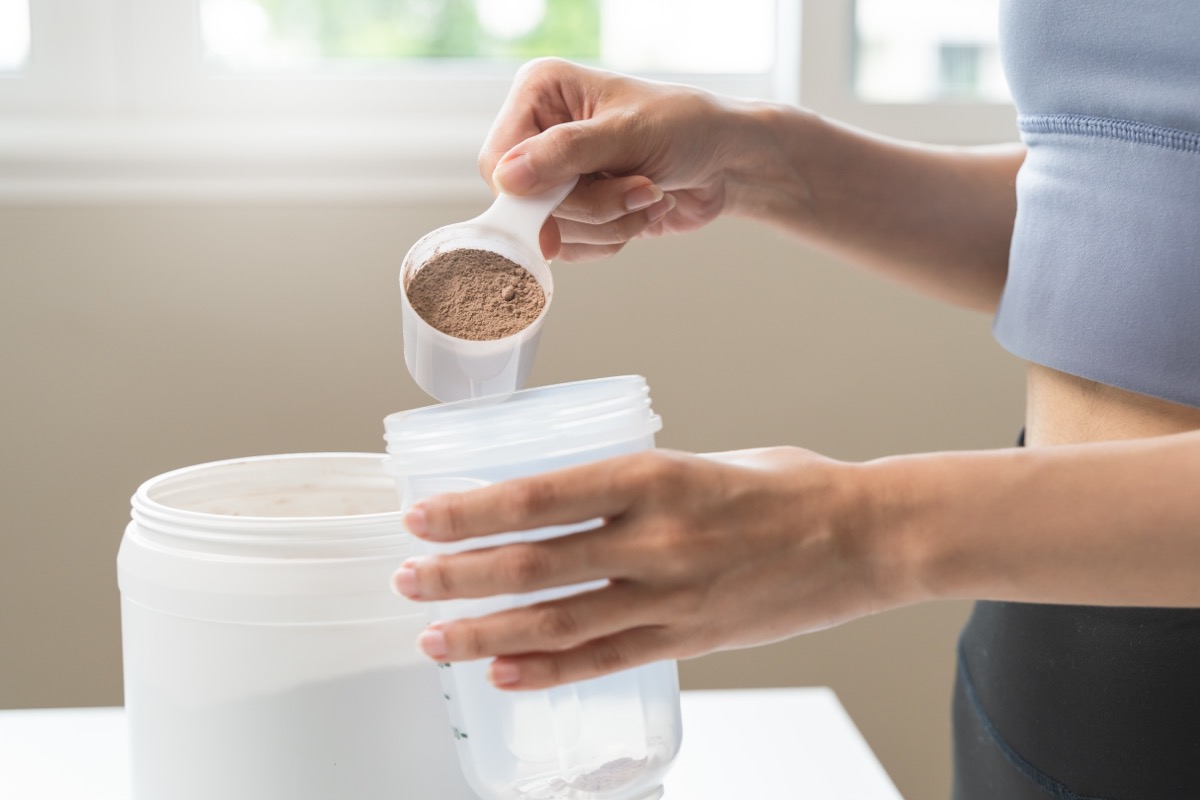Should You Use Meal-Replacement Shakes for Weight Loss? Doctors Weigh In
Weight loss experts share the pros and cons.

There's no one best way to lose weight, but there is a worst way: Crash dieting. That's because your body needs ample nutrients to fire on all cylinders, regardless of your weight loss goals. Doctors agree that if you're hoping to see the scale finally budge, it's important to strike a balance between safe calorie reduction and sound nutrition. For some people, meal-replacement shakes for weight loss help to put one meal on autopilot while focusing on nutrition throughout the rest of the day.
However, doctors say these aren't a silver-bullet solution and that they can have certain drawbacks. Read on to learn the pros and cons of meal-replacement shakes, according to weight loss doctors.
RELATED: 7 Best Protein Supplements for Weight Loss, According to Dietitians.
How Meal-Replacement Shakes May Work for You

Before even considering adding meal-replacement shakes to your menu, it's a good idea to take a good, hard look at your diet. It should include a wide range of fruits, vegetables, whole grains, healthy fats, lean proteins, and plenty of water. For many people, switching to minimally processed foods will lead to big changes—not only to your health but also on the scale. Add in portion control and regular physical activity, and you're almost guaranteed to see results in both areas.
Only after you've established healthy habits in your diet should you even consider other means of lowering your overall calorie intake. However, when used strategically, meal replacement shakes may help you reach your goals faster, some doctors say.
"Meal replacement shakes come in pre-measured servings, which can help with portion control. This is particularly useful for those trying to manage their calorie intake and avoid overeating," says Franklin Joseph, MD, MBBS, chief medical officer for Dr. Frank's Weight Loss Clinic.
He adds that, in general, these products tend to be nutritionally sound, if not complete: "These shakes are typically formulated to provide a balanced mix of essential nutrients, including vitamins, minerals, protein, carbohydrates, and fats. This helps ensure that users get a well-rounded nutritional profile even when they are not consuming a traditional meal."
Additionally, Joseph notes that because they take almost no preparation, meal-replacement shakes can be a great option for busy individuals who may not have time to cook a full, healthy meal.
"They can also help maintain dietary consistency. This can be especially helpful for those who struggle to adhere to a regular eating schedule or for individuals who are following specific dietary plans," he tells Best Life.
Joseph adds that many brands now offer shakes tailored to specific health goals, such as increased protein intake for muscle building or low-carbohydrate formulations for those following a ketogenic diet. This customization can help individuals more effectively meet their specific dietary needs.
RELATED: When Your Weight Loss Will Plateau, Science Says—And How to Fight Back.
Some Doctors Urge Caution

However, some doctors say these products can have drawbacks and that it's important to manage your expectations.
Sue Decotiis, MD, a New York City-based weight-loss doctor, agrees that meal-replacement shakes can be useful on occasion, "especially if you have a busy day and you're rushing from one thing to the next."
However, she notes that you can't rely on these to fulfill your nutritional needs. "The benefits are these shakes are typically low in calories, and they're easy to consume if you're on the run, but they shouldn't be heavily relied on for a balanced diet," she says.
Part of the problem, Decotiis says, is that they're missing important amino acids your body needs to maintain muscle mass. She warns that some brands also include unhealthy sweeteners or artificial flavors, lowering their nutritional value.
"The best shakes you can make are at home with your own protein source. By making it yourself, you can avoid the excess sugar or artificial sweaters," she tells Best Life.
Meghan Garcia-Webb, MD, a triple board-certified doctor specializing in internal medicine, lifestyle medicine, and obesity medicine, stresses that it's important not to abuse meal-replacement shakes by looking for fast results.
"If it is something that you want to do short term, several times per day, and then stop after a certain milestone—that sets patients up for failure when they return to eating real food," she tells Best Life.
"If you see meal replacement shakes as a helpful long-term tool in your health journey, then go for it. If you see them as a quick way to get to a certain size or number on the scale, you are setting yourself up for disappointment later on, so best to hold off and focus on more sustainable changes," Garcia-Webb advises.
RELATED: Certain Foods Trigger Natural Ozempic-Like Weight Loss Effect, Doctor Says.
Here's What the Research Says

A 2010 study published in Nutrition Journal compared the weight loss results of 90 obese adults over a 40-week trial period. One cohort followed a Medifast meal-replacement program, while the other followed an isocaloric, food-based diet. This means that the two programs were identical in total caloric intake but different in terms of macronutrient content.
"Weight loss at 16 weeks was significantly better in the Medifast group (MD) versus the food-based group (FB) (12.3 percent vs. 6.9 percent)," the study authors wrote.
They added that significantly more of the meal-replacement participants lost at least five percent of their initial weight at week 16 (93 percent vs. 55 percent) and week 40 (62 percent vs. 30 percent). The meal-replacement group also saw "significant improvements in body composition" compared to the food-based group at week 16 and week 40.
However, the team also found that those who followed the meal-replacement program were significantly more likely to regain weight during the maintenance phase than those who followed the food-based program.
"At week 40, both groups experienced improvements in biochemical outcomes and other clinical indicators," the study states. These include inflammation and oxidative stress, both of which contribute to a range of chronic illnesses.
RELATED: 9 High-Fiber Foods for Weight Loss That Will Keep You Full and Satisfied.
Are Meal-Replacement Shakes Good for Weight Loss?

Overall, the doctors seem to be in agreement that meal-replacement shakes can serve as a healthy replacement for your worst dietary habits but not your best ones. In other words, if you're on the verge of reaching for a quick and easy, processed meal, this is when a meal-replacement shake can help keep you on track for your health and weight loss goals.
"I think one or two shakes a day is okay, and it's definitely better than ordering fast food, but I don't think replacing all your meals with a shake is a good idea," says Decotiis.
Speak with your doctor to determine if weight loss shakes may be beneficial for you. If so, look for brands that nix added sugars or artificial flavors in favor of complete nutrition and natural ingredients.
Best Life offers the most up-to-date information from top experts, new research, and health agencies, but our content is not meant to be a substitute for professional guidance. If you have health questions or concerns, always consult your healthcare provider directly.





















